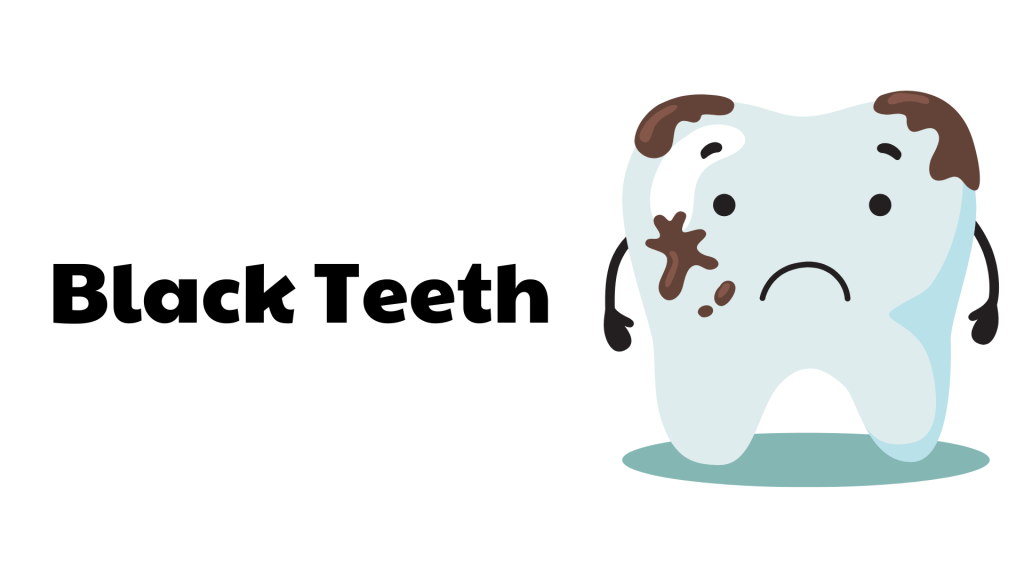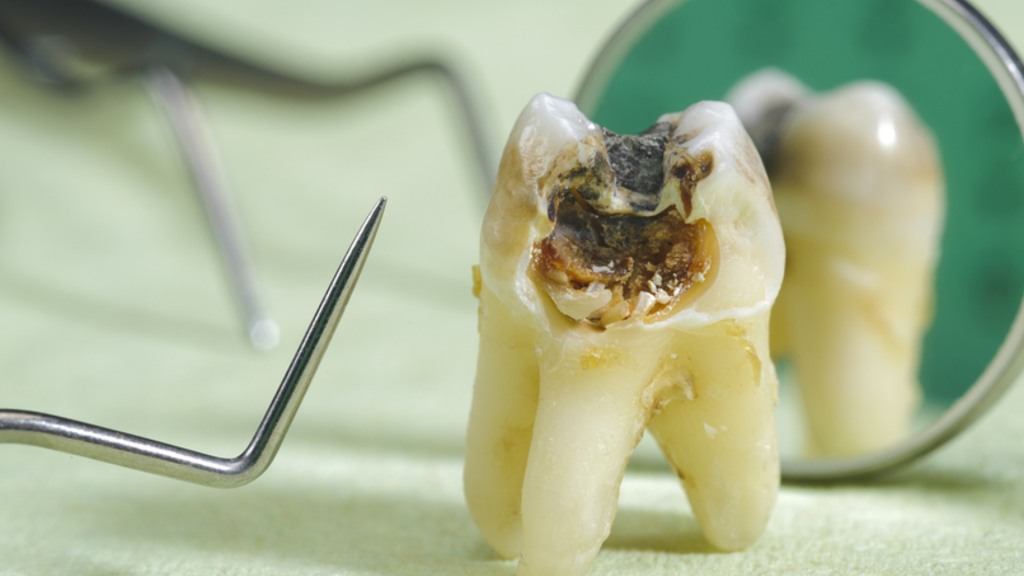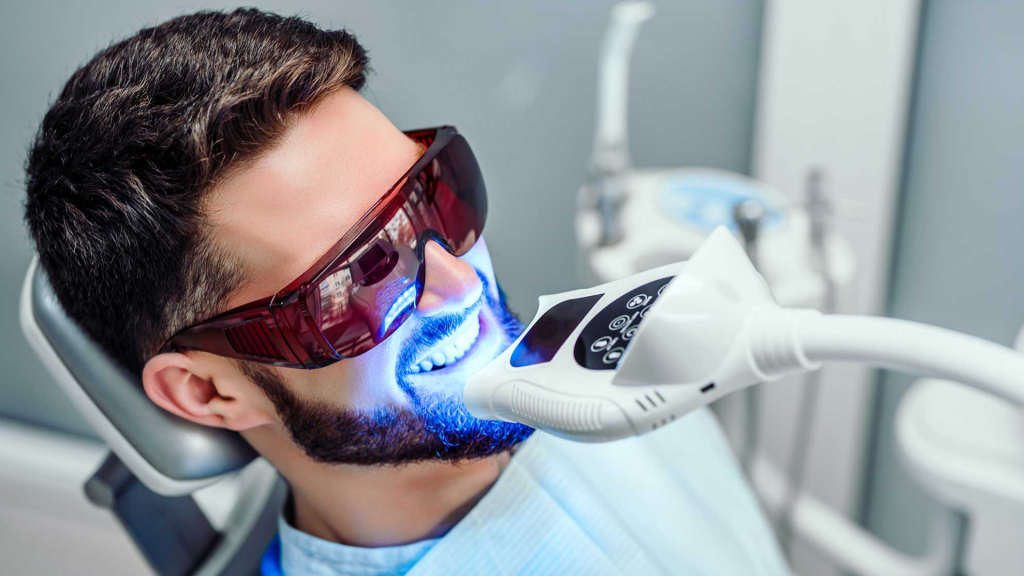Black teeth are a nightmare that may ruin a smile. Discoloration and darkening of teeth may humiliate and make us self-conscious in social situations. Maintaining dental health and a beautiful smile requires recognizing the causes of black teeth and finding treatments.
In this investigation of black teeth, we shall examine its causes and its health dangers. We will also discover how contemporary dentistry can brighten our smiles and give us confidence again.
Black Teeth – What Is It?

Are Black Teeth Dangerous?
Black teeth are hazardous to dental health and should be avoided at all costs. Although the degree of blackness varies from case to case, it is always an indicator that something is wrong in the mouth and should be properly examined.
- Oral health problems: Black teeth may signify dental enamel deterioration, tooth structural loss, and tooth color loss.
- Infections and Inflammation: Plaque infections and hazardous bacteria may be responsible for black teeth, which may lead to gingivitis and other dental problems.
- Psychological impact and self-confidence: Individuals with black teeth may be self-conscious about their grins, which may have a detrimental influence on daily life and communication.
- Doubts about overall health: Smoking and other toxic chemicals may cause black teeth, which can lead to various health issues.
Thus, if your teeth are black or have lost their color, see a dentist promptly. Your dentist will diagnose this issue and offer therapy to improve and preserve oral health.
Causes Of Black Teeth
Food And Drink Anabolics
To clarify, food and drink anabolics do not induce blackening of teeth. Instead of black teeth, some chemicals might discolor yellow. The anabolic chemicals found in meals and beverages are chemical compounds that may cause tooth enamel to fade and eventually cause teeth to lose their natural white hue. When we eat big quantities of certain meals or beverages over a lengthy time, this occurs. Anabolic meals and drinks include:
- Coffee and tea: Caffeine and other things in coffee and tea can make teeth lose their natural color and get stained.
- Red Wine: Tannin, a component in red wine, may cause tooth enamel to yellow.
- Carbonated mineral water: Anabolic chemicals in carbonated water may discolor and degrade dental enamel.
However, these anabolic chemicals do not turn teeth “black,” but rather cause them to yellow or lose their original brilliant hue. If teeth are black, visit a dentist to determine the reason.
Nicotine, Tobacco
Instead of anabolics, tobacco and nicotine are to blame for the “blackening of teeth” or yellowing. Smoking and nicotine damage dental health and may cause teeth to become black, particularly with long-term usage. Toxic chemicals and plaque may get cemented to tooth enamel due to the nicotine in cigarettes. These contaminants and chemicals adhere to the tooth surface, causing the teeth to lose their natural white color. Smoking lowers blood flow to the mouth lining, impairing tooth restoration and self-repair.
Furthermore, smoking may cause a loss of mouth odor and provide ideal circumstances for bacteria to reproduce and develop in the mouth, resulting in foul breath.
Tetracycline Effects
Tetracycline is a broad-spectrum antibiotic that treats sore throats, gonorrhea, UTIs, and skin infections. However, tetracycline may darken enamel during tooth development, rendering teeth black. Tetracycline kills germs, but it may also be absorbed into growing enamel and harm its functioning cells, influencing enamel production and loss. natural white.
Both primary and permanent teeth may be affected by tetracycline, however, primary teeth are growing faster. In pregnant women or young children whose permanent teeth are still forming, the danger of tetracycline’s discoloring impact on teeth is elevated.
Bacteria And Plaque
Tooth enamel and other tooth structures may darken and discolor due to the effects of plaque and bacteria in the mouth.
- Plaque: Bacteria, food particles, and saliva form plaque, a transparent, sticky film on the tooth surface. Plaque may become petrified (calculus or “sticky”) when coupled with saliva minerals if not properly cleaned. Black teeth result from a combination of plaque and petrification, which also contributes to the development of gingivitis and other oral health issues.
- Harmful bacteria: Sugar and dietary contaminants make oral bacteria create acid. This acid damages tooth enamel and structure. If dangerous germs in the mouth are not managed, teeth may erode, break, and lose their dazzling color.
Tooth Trauma
Teeth may blacken or lose their color due to trauma or injury. However, smoking, nicotine exposure, tetracycline usage, plaque, and bacterial infections create “black teeth” more often. An accident, striking your teeth forcefully, or playing sports without proper protection may cause tooth trauma. Damaged teeth may cause:
- Damage to enamel: Enamel, the teeth’s exterior protective coating, may be damaged by a severe impact. Damaged enamel may discolor or blacken teeth.
- Cracked or broken teeth: Plaque may develop in cracked and fractured teeth after severe trauma, allowing hazardous germs to proliferate.
- Tissue damage around the teeth: Trauma may cause gingivitis and tooth loss.
In conclusion, use a mouth guard while playing sports to avoid trauma or injury-related tooth discoloration. For prompt diagnosis and treatment of tooth injuries, see a dentist.
How To Avoid Black Teeth?

For a lifetime of healthy, beautiful teeth, avoid black teeth. Food anabolics, smoking, nicotine usage, tetracycline exposure, plaque infection, dangerous microorganisms, and natural aging may all discolor teeth.
- Proper oral hygiene: Make sure you use fluoride toothpaste and brush your teeth at least twice a day. Floss and brush your teeth thoroughly. Remove germs and toxins from your mouth by brushing your tongue and the spaces between your teeth.
- Limit anabolic consumption: Anabolic foods are those that are high in caffeinated beverages, red wine, carbonated mineral water, chocolate, and brightly colored.
- Smokeless: Avoid smoking and nicotine-containing items to safeguard dental enamel.
- Regular dental check-ups and cleanings: This decreases tooth discoloration and allows for the early diagnosis of dental problems.
Keep in mind that the best way to maintain healthy teeth and avoid dental diseases like black teeth is to practice good oral hygiene and see the dentist regularly.
Black Tooth Treatments
The root of the problem must be determined before treating discolored teeth. Treatment options vary from patient to patient and may include:
- Professional teeth cleaning: If plaque infection and surface filth produce black teeth, professional teeth cleaning with bleaching or plaque scraping will eliminate plaque and enhance teeth.
- Teeth whitening: Whitening the teeth and getting rid of plaque and stains is possible in certain situations. Oral care items or contemporary whitening technologies may whiten teeth.
- Dental Veneers: Thin veneers hide stains, fissures, and uneven color on teeth. Composite or porcelain veneers enhance tooth look naturally and sustainably.
- Treating Damaged or Damaged Teeth: The dentist may fill, grind, or reshape trauma-caused black teeth.
Most crucial, see a dentist to evaluate your teeth and prescribe therapy.
Conclusion

As shown, black teeth impair appearance and oral and mental health. However, this does not indicate time or destiny. Spring Orchid Dental Clinic offers a simple and effective teeth whitening procedure. We provide the best teeth whitening treatments at Spring Orchid Dental. Our dentists will remove stains and plaque that cause black teeth and restore your natural shine using cutting-edge techniques and technology. your grin.
What sets Spring Orchid Dental apart is the care and attention given to each individual. We tailor therapy to each client’s requirements. Focusing on safety and comfort while whitening.
FAQs
Can Black Teeth Fade?
Do Asian Cultures Value Black Teeth?
In several Asian cultures, black teeth were thought beautiful and a popular cosmetic trend. However, oral attractiveness beliefs have altered and are less prevalent now. Historically, several Asian areas and peoples used teeth whitening procedures such as brushing with particular ingredients to turn teeth black, yellow, or blue. These fashions were beautiful and high-class. Black teeth were considered regal beauty in Japan and Vietnam.
However, as culture and medicine have progressed, standards for what constitutes a beautiful smile have shifted. Most people worldwide like healthy, natural white teeth. Teeth whitening is a popular way to maintain white, confident teeth.
When Should Black Teeth See The Dentist?
If you discover that your teeth are naturally black or discolored, you should make an appointment with your dentist right away; this is an indication of oral health issues. In the following cases, it may be advisable to schedule an appointment with the dentist:
- Black teeth that appear suddenly: A dentist should examine your teeth if they change color unexpectedly.
- Painful black teeth: Black teeth discomfort may indicate a gum infection, bacterial invasion, or trauma.
- Plaque and Bacteria Build Up: To avoid black teeth from plaque and bacteria buildup, get a professional teeth cleaning and dental examination.
- Suspected Pores, Cracks, or Trauma: See your dentist if you think a pore, crack, or trauma created a black tooth.
- Unstable dental condition: If you’ve undergone therapy for black teeth or other oral issues and your condition hasn’t improved, see your dentist.
In short, if you see black teeth, consult a dentist immediately. Regular dental appointments identify and prevent dental issues.





